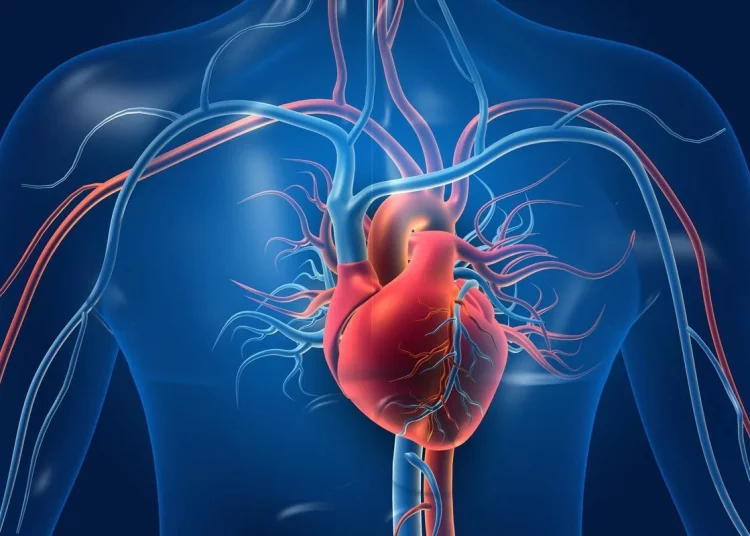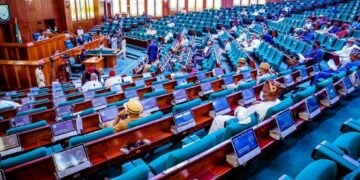Nigeria appears headed for a grave health crisis as hospitals in the country face a severe shortage of qualified medical staff in key areas of specialisation, particularly the cardiovascular unit , thereby forcing thousands of patients abroad yearly.
LEADERSHIP Sunday reports that despite the fact that cardiovascular diseases are on the rise in the country, getting care in an emergency situation remains a grave challenge due to the dearth of cardiologists in the country, especially in government hospitals.
While those who are unable to afford travelling abroad are left to die or are placed on queues of between two to three months to get access to a cardiologist.
A cardiologist is a physician who’s an expert in the care of the heart and blood vessels. They treat or help prevent a number of cardiovascular problems. They are also specialized in specific areas, such as abnormal heart rhythms, heart failure or heart problems suffered from birth.
LEADERSHIP Sunday further gathered that these all important healthcare givers treat chest pain, high blood pressure and heart failure, as well as problems with your heart valves, blood vessels and other heart and vascular issues. They can order tests like electrocardiograms, echocardiograms and CTs (computed tomography) to find out what’s wrong. With their diagnosis, they can order medicine, help their patients start healthier exercise and eating habits or do cardiac catheterization.
A cardiologist who pleaded not to be named told LEADERSHIP Sunday that recent findings show that the acute shortage of medical workers in the country’s health system, particularly, specialist in the field of cardiology is constituting a challenge as prompt and proper medical care for patients with heart related disorders and other specialist care are becoming more difficult by the day.
She stated that as at 2020 , “We had less than about 500 cardiologists to over 200 million populations and it is possible that this number is less because a lot of our people are migrating out of the country for lack of job satisfaction, monitory and otherwise.
“On average, we probably produce only about 8 cardiologists per year. And, we are losing a lot, even those practising are largely concentrated in the big cities.
She however, acknowledged that, “Despite all these problems, we are making a lot of strides in the profession. Some years ago, we couldn’t do open-heart surgeries in many places in this country. We can’t even do what we call invasive procedures and noninvasive procedures in many places. Now, some of these things are being developed in many centres.
According to Nigerian cardiologists under the auspices of the Nigerian Cardiac Society, (NSC), the federal government must build up stronger infrastructures and attend to the welfare needs of medical manpower in the country to avoid a time bomb of brain drain.
In Nasarawa State, LEADERSHIP Sunday gathered from the only tertiary health facility in Lafia, state capital , Dalhatu Araf Specialist Hospital (DASH) has two cardiologists consultants. It was also confirmed that each cardiologists sees forty patients daily.
However, information from medical record indicated that patients with severe cardio vascular cases were given only seven days appointment to see doctor, while those from the ward had grace of three weeks and out -patients had up to four months to see a cardiologists.
A patient, Eunice Maku expressed discontentment over the hand -in glove of cardiologists to attend to patients, adding that her next appointment is due for August 15, 2022.
Another patient, Umar Wada complained that were subjected to anguish, saying he was given an appointment for August 18, 2022 to see a cardiologists.
In Enugu State, a cardiologist who spoke on condition of anonymity said there are more than 10 well trained cardiologists in Enugu State.
However, a heart disease patient, Agatha Ibeh countered him as she revealed that they were currently finding it difficult to book for treatment due to paucity of treatment centers and cardiologists.
She said, ‘There are only few heart disease centers in Enugu and there are so many patients. Besides, cardiologists are few in Enugu State. Also, the cost of treatment is very high and the free treatment centers are few.” He stated.
A patient battling with cardiovascular diseases, Idris Alhassan , told LEADERSHIP Sunday, that they go through unbearable pain to the point of death just to get access care.
He said, “I was hypertensive initially. It is over three years and some months now,” he said while struggling to contend with pains on his raised hospital bed.
Alhassan was admitted to Abubakar Tafawa Balewa Teaching Hospital , Bauchi State recently, and has been battling the ailment for three years now.
While explaining that the process was really stressful, he said, “One has to come by 6:00 am to submit hand card’, and then wait until the cardiologists arrives.
Tawus Haruna, 60, also a patient struggling with cardiovascular disease said seeing a doctor is another stressful expedition in the hospital. “But with the help of” his cousin who works in the hospital, the game became easier for him.
Though Imo State parades over twenty cardiologists, investigation by LEADERSHIP Sunday reveals most of these cardiologists, who consult for the Federal Medical Centre, Owerri and the Imo State Teaching Hospital have their private clinics where they attend to the wealthy.
A heart disease patient, Hon. Uche Amadi, stressed that it is very frustrating securing an appointment with a cardiologist in the state.
In Rivers State, there are about 10 cardiologists working in six public and private hospitals in Port Harcourt, the state capital.
However, patients suffering from heart-related issues in the state believe that the number of cardiologists were not enough considering the population of the state.
A patient, who pleaded anonymity told LEADERSHIP Sunday at the UPTH that if there were enough cardiologists, patients will not be spending days before having access to one.
He said: “Since I started coming here (UPTH), I have been seeing only two doctors and it takes days before they come, meaning that their schedules are tight.
In Delta State, there are four cardiologists at the Federal Medical Center, (FMC), Asaba with two being on full time while the other two are on part time.
To see a cardiologist is very tasking at FMC because of the long list of patients who are already on appointment.
Dr Valentine Emeka Amadi, Cardiology Unit, Department of Internal Medicine, Federal Medical Center, (FMC), Asaba, said appointment to see any cardiologist on Tuesday and Wednesday every week in the hospital is not really easy because many other patients are already on appointment .
There are cardiologists too at the state specialist hospitals in Asaba, Ughelli, Sapele, Warri. However, the chances to see them immediately is a herculean task.
One other observation at the FMC, Asaba is that a sick patient can easily get treatment anytime at the accident and emergency unit without booking. However, if the patient is not sick, he has to book an appointment at the medical outpatient cardiology clinic.
In Jigawa State, there are only two cardiologist consultants who are working with the Rashid Shekoni Teaching Hospital Dutse.
According to the permanent secretary of the state ministry of education, Dr Salisu Muazu said they were expecting some students to complete their five year specialist study on cardiology and join the state service in the next few years.
When contacted, the medical director, Rashid Shakoni Teaching Hospital Dutse. Dr Magaji stated that, the hospital is blessed with two cardiologist consultants who are do their clinical rounds every Wednesday.
On the number of heart disease experts currently operating in Cross River state, clinical lecturer, department of Medicine and Surgery, School of Medical Sciences, University of Calabar, who doubles as cardio thoracic surgeon at the University of Calabar Teaching Hospital UCTH, Dr. Stephen Ogbugu, stated that about six heart surgeons operate in the state.
Ogbugu said, “I Consult for the University of Calabar Teaching Hospital UCTH. I don’t have another place that I consult for now.
On the difficulties in booking for appointments and waiting period to meet with cardiologists, Mbeku said, “Usually they make the visitation, on Tuesdays and Thursdays. Outside that, it’s difficult to meet with them as some of them are said to be consulting in more than one hospital.”
There are only four cardiologists in the entire Sokoto state. While Zamfara has two, Kebbi has none.
The four cardiologists in the state, according to Dr Muawiya Usman, a cardiologist, who spoke to our correspondent, are in two hospitals. Three are at the Usmanu Danfodiyo University Teaching Hospital, UDUTH, and one is at Sokoto State Specialist Hospital.
At the Federal Medical Centre, Umuahia, the Abia State capital, Dr Kelechukwu Uwanurochi told LEADERDHIP Sunday that there are six cardiologists in the state.
He added that based on their workload, as some of them are engaged in either private practice or teaching in medical schools, scheduled appointments have been the best option to reach them.
A middle-aged patient in a private hospital in Umuahia where one of the consultants practices, Dame Lucille Mbamara, confirmed that scheduled appointments had been working for her. Another patient in a telephone conversation in Aba, who pleaded anonymity, said he had suffered disappointments on about three ocassions on account of the consultant having been invited for emergencies.
Shockingly, even in the Federal Capital Territory (FCT), patients are usually given between two to three months appointments, as only fifteen heart doctors operates in the nation’s capital. Out of this number, LEADERSHIP Sunday gathered that only three cardiologistds service general hospitals in FCT.
Giving a breakdown, a source at the records unit at the MAITAMA General Hospital revealed that the three cardiologists service Gwagwalada Specialists Hospital, Asokoro District Hospital and the Maitaima District Hospital
A consultant cardiologist with the Alliance Hospital, Abuja, Dr. Salau Ibrahim, told LEADERSHIP Sunday that there are about 15 to 20 cardiologists in the FCT, saying that the number is very minimal and that a city like Abuja should have more than that.
Ibrahim said because of the few cardiologists in the city, most of the patients stay long with the primary care physicians who manage them for some time till when a cardiovascular event occurs like either stroke or heart failure, before the patient is referred to a cardiologist, usually very late.
He, however, said that in the management of hypertension for example, it is not necessarily that a specialist like a cardiologist manages it, except if it becomes so complicated or it is envisaged that the hypertension is likely going to cause a high risk cardiovascular effect later.
He also said that about 50 per cent of hypertension cases have other cardiovascular risk factors like diabetes and lipid problem.
“When you see a patient that is of high risk, that is when you move from a primary care physician to a cardiologist.That is why we have said that when you see that a person who have other cardiovascular risk factors, refer that patient to a cardiologist to prevent such cardiovascular event from occurring,” he said.
On the way out, the physician said, ‘there is need for training and retraining of more specialists and training of the primary care physicians to identify high risk hypertension patients and to make then know that early referral is important,
“Even if there are not enough cardiologists, the few that we have should be able to manage the patients. He concluded’.
Another doctor who asked that his identity be protected to avoid sanctions and spoke on the unfortunate development said, ‘The point is that when patients come to the hospital, they think we are just resuming, they don’t know and don’t even want to know that many of us are overworked doctors who have not rested in a long while.”
“All they want is excellent treatment. Patients are assuming that the right things would have been done and the right things are on ground but that’s not exactly what’s going on here.
A Consultant Cardiologist, Lagos University Teaching Hospital, LUTH Prof. Amam Mbakwem, said the annoying thing is that as they are training, they’re leaving.
She said so many things are causing their migration.
Mbakwem said: “First of all, the facilities where we practice; the hospitals don’t give you tools you need to practice the skills that you have that is on one side.
“And then, what our colleagues do outside, we have to struggle to do it here and then after doing it, we are not paid anything commensurable.”
She added: “Again, Nigeria is bleeding money because this is one place where we spend peanut to train doctors, most of the time, it is the government’s money that we use to train doctors. And then you finish training them and somebody poaches them, and they go to work for somebody else.”
In his view, Professor of Medicine, Rivers State University, Chizindu Alikor, if the trend of migration continues for five to 10 years from now, “we probably will not have doctors and specialist cardiologists available to attend to the health needs of this country.”
He charged the government to wake up in addressing those issues that are responsible for this level of brain drain.
And if the government is shying away from that responsibility, I think the public needs to know that it is their right to insist that we must have specialists,” he added





